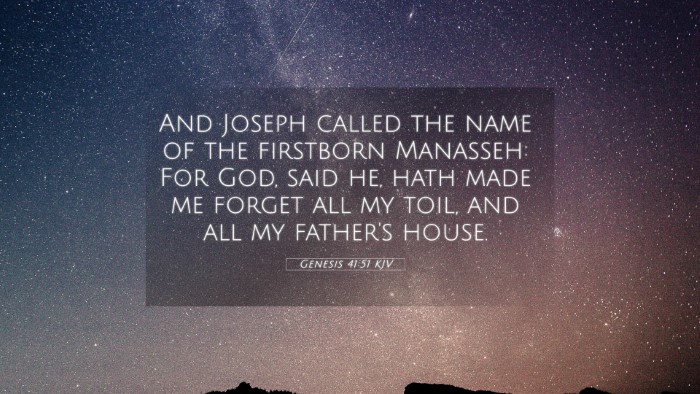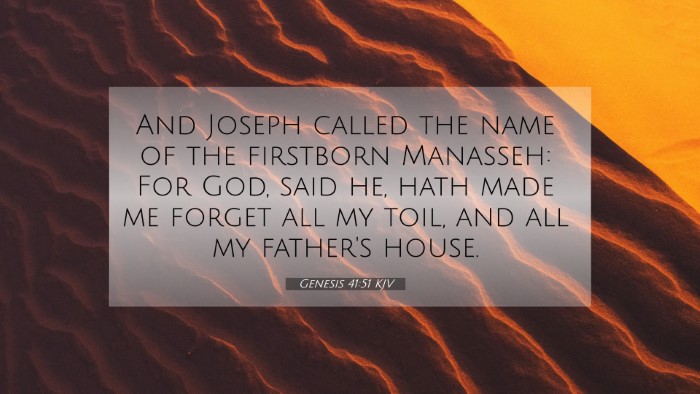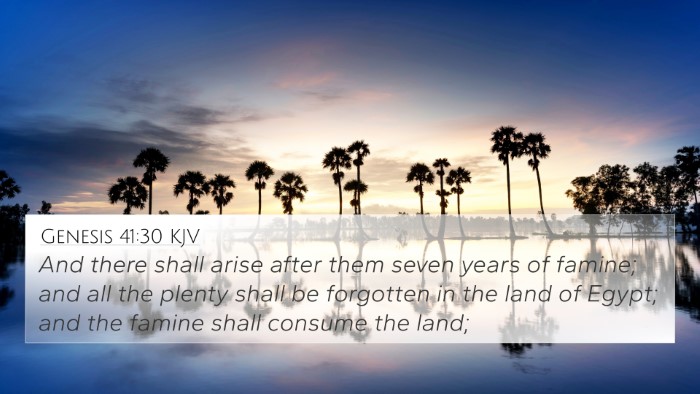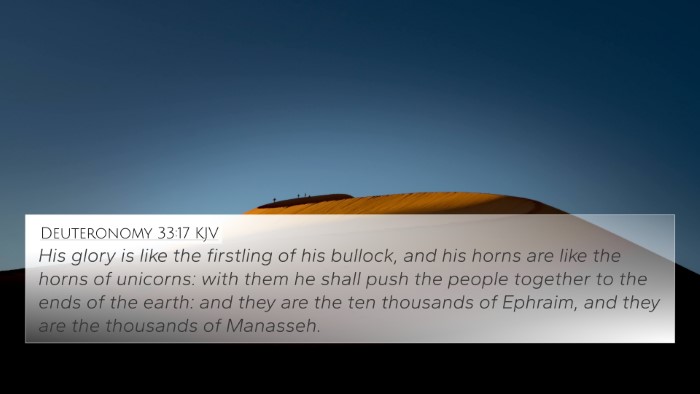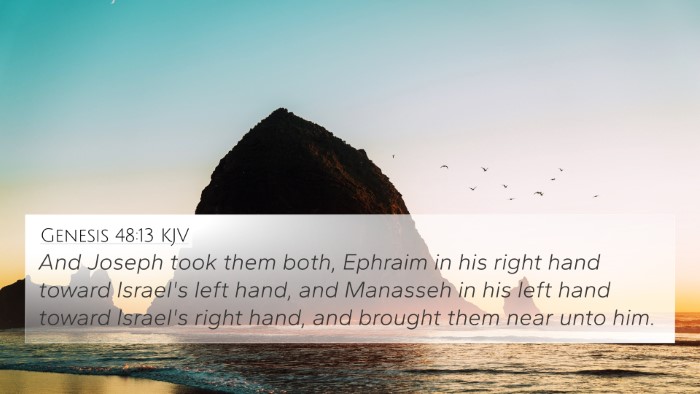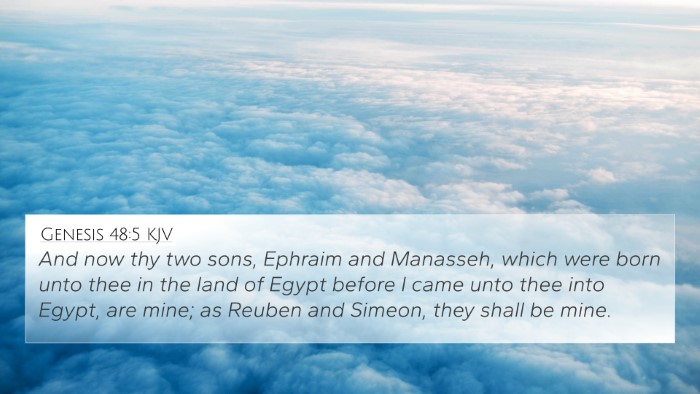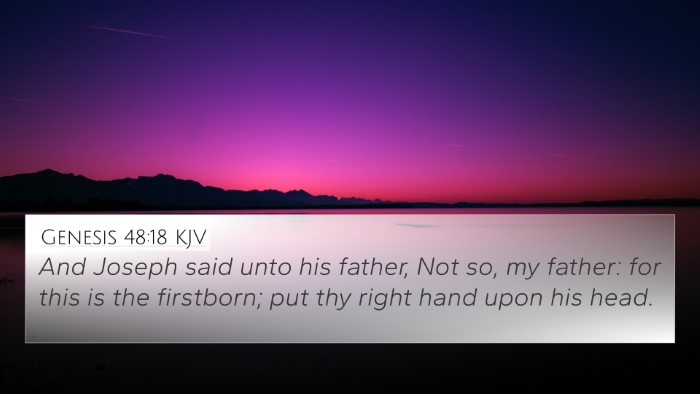Understanding Genesis 41:51
Genesis 41:51 states:
“And Joseph called the name of the firstborn Manasseh: For God, said he, hath made me forget all my toil, and all my father’s house.”
Summary of Meaning
This verse captures a significant moment in Joseph's life after his long and arduous journey of suffering and eventual rise to power in Egypt. By naming his firstborn Joseph, he expresses the joy and relief from his past pains and trials, demonstrating how God has helped him overcome his past grievances.
Insights from Public Domain Commentaries
Matthew Henry's Commentary
Matthew Henry highlights Joseph’s ability to move past his trials after being given a new lease on life in Egypt. The name "Manasseh" itself is indicative of forgetting; Joseph acknowledges the role of God in his ability to forget the hardships of his earlier life. This reflects a deep spiritual truth: God’s blessings help to erase the memories of past sufferings.
Albert Barnes' Notes on the Bible
Albert Barnes emphasizes Joseph's recognition of God's providence. The act of naming his son is seen as an acknowledgment of divine intervention in his life, a memory of how God led him from the pit to prominence. This recognition solidifies the theme of divine favor amidst adversity.
Adam Clarke's Commentary
Adam Clarke points out that the naming of Manasseh signifies a turning point for Joseph, who had endured significant familial strife and betrayal. Clarke notes that in Hebrew culture, names held power and meaning, so Joseph's choice reflects both gratitude and a resolve to focus on his current state rather than past sorrows.
Bible Cross-References Related to Genesis 41:51
- Genesis 37:28: Joseph sold into slavery, highlighting the start of his turmoil.
- Genesis 39:1-2: Joseph’s rise in Potiphar’s house represents a shift towards success.
- Genesis 45:5: Joseph, later, reflects on God’s plan in the face of adversity.
- Romans 8:28: God's promise that all things work together for good, paralleling Joseph's story.
- Psalms 105:17-19: An acknowledgment of Joseph’s trials and how God intervened.
- Hebrews 11:22: A mention of Joseph’s faith in God’s promise despite hardship.
- Isaiah 43:18-19: God’s promise to create new things, related to Joseph’s new life.
- Genesis 50:20: Joseph’s acknowledgment of God’s purpose in his suffering.
- James 1:12: The blessing of those who endure trials, connecting with Joseph’s faith.
- 2 Corinthians 1:3-4: Comfort stemming from God, echoing Joseph's experience of divine solace.
Connections Between Bible Verses
Genesis 41:51 serves as a pivotal point in understanding Joseph's character and faith. The connections to other verses enrich the interpretation of his experiences, highlighting thematic Bible connections such as:
- Forgiveness and healing from past trauma.
- The theme of divine providence throughout Scripture.
- The journey from suffering to joy as a narrative found across different Biblical accounts.
Inter-Biblical Dialogue
The experience of Joseph resonates throughout both the Old and New Testaments. The parallels drawn from other figures who faced adversity and overcame through faith emphasize the importance of understanding the continuity of God’s purpose across the whole Bible.
Thematic Bible Verse Connections
Joseph’s story is illustrative of the broad themes in the Bible, including redemption, hope, and the transformative power of God’s grace. It connects with many characters and teachings, emphasizing that through faith, one can find purpose amidst trials.
Bible Cross-Reference Guide
To study this verse deeper, consider tools like a Bible concordance that can aid in identifying links between Joseph’s trials and the promises found in other scriptures, further offering insights into the nature of God’s relationship with His people.
Conclusion
Genesis 41:51 encapsulates a moment of profound significance within Joseph’s narrative, illustrating the power of God to help His followers forget their past pains and embrace a new future. Through cross-referencing this verse with others, believers can discover rich insights into both personal faith and the broader narrative of redemption found throughout the Bible.

